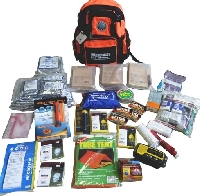
Emergency food supplies can be a lifesaver in a variety of critical situations
When it’s so easy to stop by the local grocery store for that gallon of milk or loaf of bread, it’s easy to forget that a hurricane, flood or other natural disaster could make that simple errand impossible. That’s why we all need to make sure we have survival basics on hand.
Forget the image of the survivalist, building a bunker and stashing away food for the next ten years. This isn’t about going to extremes. It’s about having the basics to last for a few days until help can arrive or the power is restored. And that means having the emergency food supplies, warmth and safety supplies and other things we need on hand and accessible.
Still think you don’t need to stock up? Read on … if you fall into one of the categories below, odds are you need to think about having an emergency preparedness kit on hand.
1) You live in an area that’s prone to hurricanes, tornadoes, earthquakes, floods, blizzards or fires
Almost everyone in the United States is at risk for one of those kinds of natural disasters. Sure, it might have been years since the last hurricane hit South Florida. Or the big earthquake experts claim could strike the Intermountain West may seem unlikely. But the fact is, when a natural disaster happens, you might not have time to gather the basic supplies you need like blankets, extra clothing, emergency food supplies and safety gear.
~
Even with things like hurricanes where warnings are usually issued days in advance, stores can quickly run out of the things you need. If you don’t have it on hand, you may have to do without. And that can make the experience more stressful … or even dangerous.
2) You have children or elderly family members at home
Emergency situations can be especially hard on kids and the elderly. Add to that not having familiar foods, toys, or enough warmth and shelter and the effects could quickly multiply. Keeping 72-hour kits on hand and accessible for each family member can minimize the impact of an emergency, and make it easier to get back to normal afterwards.
3) You live on a tight budget
It might seem counter-intuitive to say that people on a limited budget should spend money on emergency preparedness. But the fact is it’s easier to stock up slowly, spending a few dollars here and there than it is to run out and buy it all when an emergency is at hand.
And because your funds are tight, you’re also less likely to be able to afford to leave your home for a hotel, or to catch a flight out. That means you need to have the food and other supplies on hand to carry you through the disaster at home.
4) You drive a car
Emergencies can strike when we’re away from home, too. And sometimes just the distance from work to home is too far — or too dangerous — to travel. That means you also need to keep emergency supplies in your car, too. A backpack in the trunk or backseat can hold a space blanket or two (warmth), a flashlight (with extra batteries), a few concentrated food energy bars, water bottles or pouches and a change of clothing, plus health and safety supplies like extra medicine, extra eyeglasses and a first aid kit.
In a blizzard, flood or other emergency, those simple things could save a life.
5) You work for a living
Experts recommend that people have enough savings to cover six months without income. But as wonderful as that advice is, few of us can manage to keep that much money in the bank. That means many of us would have to cut back on even the basics if we lost our jobs.
Building up your food storage as well as a supply of toiletries, household goods, medical supplies and basic clothing can keep you and your family well-fed and safe until you can replace the lost income.
Some emergency preparedness basics
Clearly, almost everyone needs to prepare for an emergency and that includes keeping food on hand. Preparedness experts suggest you create a 72-hour (three day) kit for each family member, and keep them somewhere you can easily get to them. It’s also a good idea to keep basic emergency supplies in your car, and to create a duplicate 72-hour kit for your child”s daycare or babysitter’s home.
Make sure you keep the kits up to date, so food stays fresh and clothing still fits. Do include extra medical supplies and personal comfort items along with the food/water/shelter basics.
An emergency can happen to anyone. Make sure your family is ready to get through it safely.

